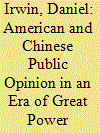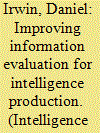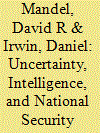| Srl | Item |
| 1 |
ID:
192087


|
|
|
|
|
| Summary/Abstract |
As the US-China great power competition intensifies, public opinion polling may help gauge internal drivers of foreign policy decision-making. Using Pew Research Center data, the authors analyzed how American and Chinese respondents viewed their own and each other’s countries between 2008–2016. They further examined how American attitudes towards China varied by political affiliation between 2008–2019. Both Americans and the Chinese displayed ingroup bias (i.e. rating their own country more positively than the other) and viewed China as a challenger to US hegemony. However, while the Chinese exhibited higher levels of ingroup bias overall, there was no evidence of increasing bias over time. Meanwhile, Americans showed increasing ingroup bias, primarily due to their souring evaluations of China, a tendency that was strongest among Republicans.
|
|
|
|
|
|
|
|
|
|
|
|
|
|
|
|
| 2 |
ID:
165671


|
|
|
|
|
| Summary/Abstract |
National security decision-making is informed by intelligence assessments, which in turn depend on sound information evaluation. We critically examine information evaluation methods, arguing that they mask rather than effectively guide subjectivity in intelligence assessment. Drawing on the guidance metaphor, we propose that rigid ‘all-purpose’ information evaluation methods be replaced by flexible ‘context-sensitive’ guidelines aimed at improving the soundness, precision, accuracy and clarity of irreducibly subjective judgments. Specific guidelines, supported by empirical evidence, include use of numeric probability estimates to quantify the judged likelihood of information accuracy, promoting collector-analyst collaboration and periodic revaluation of information as new information is acquired.
|
|
|
|
|
|
|
|
|
|
|
|
|
|
|
|
| 3 |
ID:
179157


|
|
|
|
|
| Summary/Abstract |
Intelligence analysis and national security decisionmaking are pervaded by uncertainty. The most consequential decisions that leaders make, such as whether to go to war, are mired in uncertainties not only reflecting what is unknown but also what is unknowable, such as the intentions of others who may not have made up their own minds.1 Those uncertainties not only make decisions about how to resolve international conflicts more difficult, they change the odds of going to war. Powerful countries seldom wage war to conquer weaker ones but rather to prevent them from developing breakout technologies that could threaten them in the long run.2 Such decisions are inevitably made under uncertainty, and the deeper and more vexing the uncertainties are, the more likely war is to follow as a conflict resolution strategy.
|
|
|
|
|
|
|
|
|
|
|
|
|
|
|
|